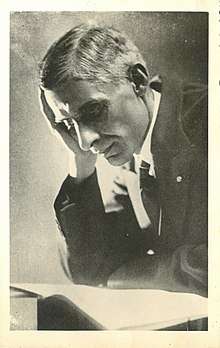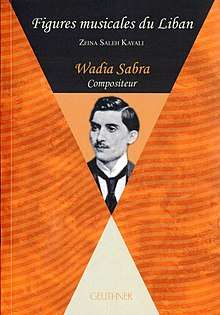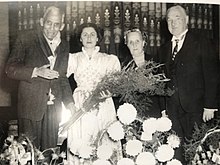Wadia Sabra
Wadia Sabra (Arabic: وديع صبرا Wadī' Ṣabrā; 23 February 1876 – 11 April 1952) was a Lebanese composer and founder of the Conservatoire Libanais.
Biography | |
|---|---|
 | |
| Born | February 23, 1876 |
| Died | April 11, 1952 (aged 76) |
| Burial place | Evangelical Cemetary Sodeco Beirut |
| Nationality | Lebanese |
| Known for | 1st Lebanese to study at the Paris Conservatoire |
| Spouse(s) | Adèle Misk |
| Relatives |
|
Life


Wadia Sabra was born in Ain el Jdideh and died in Beirut. He married Miss Adèle Misk in 1921 but had no children. He's buried in the Evangelical Cemetery in Sodeco Beirut.
As a composer, his music is characterized as a blend of Western and Eastern musical languages, incorporating the strengths and charms of both traditions. He is best known today as the composer of the Lebanese National Anthem, popularly known as Kulluna lil Watan (words by Rashid Nakhle), which was officially adopted by the Lebanese Government through a presidential decree on 12 July 1927.
He's considered the founding father of classical music in Lebanon.
After studying at the American University of Beirut, he left for Paris in 1892, with a scholarship from the French Embassy to study at the Conservatoire de Paris. He stayed for 7 years where he studied with the musicologist Albert Lavignac. He took a job as the principal organist of the Evangelical Church of the Holy Spirit. He then returned to Beirut, where he founded, in 1910, the first School of Music (Dar ul Musica). Despite having a great interest in the study of Western disciplines, Wadia Sabra was, during his first stay in Paris, the initiator of a new style in oriental music, particularly Lebanese. His conspicuous taste for research made him return to Paris, where he worked with the Pleyel studios to develop a "new unit of measurement", the "universal range", which he was going to present to the specialists in music during a Congress planned in Beirut, when death came by surprise on April 11, 1952.
Sabra who was the founder-administrator of "Dar ul Musica" had the satisfaction of seeing this School become “National"on 31 October 1925, which, in 1929, also grew to became the "National Conservatory ", which he was called to direct. Not only does his legacy include a keyboard with quarter-tone intervals, but also an appreciated - and discussed - work on "Arab music, basis of Western art", as well as a certain number of various works, including the Lebanese National Anthem. The National School of Music has been endowed with a Monthly Review, a sort of permanent link between this Institution, its students, and the first music lovers of Lebanon.
Most of Sabra's music was considered lost, and only a few examples of his work remained in the performance repertoire; however, since 2016, all his works have been found and archived at the Centre du patrimoine musical libanais (CMPL).
Wadia Sabra was in ruins after spending all his money on his work; hence, after many unsuccessful requests of grants and retirement pension to the Lebanese government, his wife, Mrs. Adèle Misk, went to live with her nephew Dr. Robert Misk. Moreover, the atmosphere between Adèle and their adoptive daughter Miss Badiha Ashkar had arrived to a point of no return, she decided to hide all her husband's works in a big blue trunk, La Malle Bleue. They remained there until 2016, when the Misk family gave it to the CPML for safe keeping.
Thanks to these precious archives, Mrs Zeina Saleh Kayali was able to write his full biography in 2018 in the collection "Figures musicales du Liban [archive]". éditions Geuthner (ISBN 978-2-7053-4002-5)
He had an oriental piano manufactured by Pleyel in Paris in 1920.
Selected works
Operas
- Les Bergers de Canaan , (The Shepards of Canaan) biblique opera in Turkish, libretto by Halide Edib Hanoum, 1917, French version by Mrs J.Ph de Barjeau
- Les Deux Rois, (The Two Kings) 1st opera in Arabic, libretto by father Maroun Ghosn, 1928
- L'Émigré, (The Emigrant) French operetta, libretto by Robert Chamboulan, 1931
Oratorio
- Les Voix de Noël, Oratorio pour solistes (Baryton, Mezzo, ténor et choeur), paroles d'Auguste Fisch 1896
- Nous prêchons ton amour, cantique religieux pour solo (Mezzo ou Baryton) et choeur, 1896
- Venez à moi, cantique religieux pour solo (Mezzo ou Baryton)et choeur, 1896
- La gloire du Liban, cantique pour solo et choeur, paroles du père Maroun Ghosn (1880-1940)
Melodies
- Quoi? tout est fini?, Arabic lyrics by Saïd Akl
- Souvenir d'une mère, Arabic lyrics by Shibli Mallat (1876-1961)
- Notre mère la Terre, Arabic lyrics by Rushdi Ma'louf (1915-1980)
- Moi, c'est le Liban, pour soliste et choeur, Arabic lyrics.
- Le desert, pour soliste et choeur, Arabic lyrics
- Ya Misrou, Chant Patriotique en l'honneur du héros national Saad Zaghloul Pacha, Arabic lyrics by d'Alexandra d'Avierino
- L'Hymne de la Gaule, French lyrics by E.Creissel
Piano
- Valse de Concert
- Valse Caprice
- Valse Orientale
- La Rozana, 12 variations sur l'air populaire
- El Dabké, le véritable quadrille orientale
- Gavotte en ré mineur
- Hawed min hona, 12 variations
- Several untitled pieces, essentially dances & marches
- Recueil d'airs Orientaux :
- Ahwal-Ghazal
- Ouaskinir-Rah
- Kaddoukal Mayyass
- Raieh feine
- Antal Moumannah
- Marche Orientale
- Kom Ouastameh
- Ya Gazâli
- Padishahem
- Al Djazayer
- Polka Orientale
- Ya Safal Azman
- Binteche Chalabyya
- Owmi Tkhaddari
- Tafta Hindi
- Madad-Madad
- La Constitutionnelle
- Hymne Constitutionnel
- 2e Marche Orientale
- 3e Marche Orientale
Decorations
- Academic palms, officer rank (France)
- Medal of Officer of the Order of Public Instruction (France)
- Cross of Merit (Lebanon)
- Knight of the Legion of Honor (France)
- Gold Medal of Lebanese Merit (posthumously)
References
- Zeina Saleh Kayali "Figures musicales du Liban" aux éditions Geuthner (ISBN 978-2-7053-4002-5)
- 'OperaGlass' page (cached)